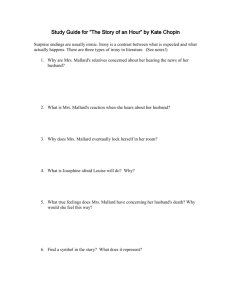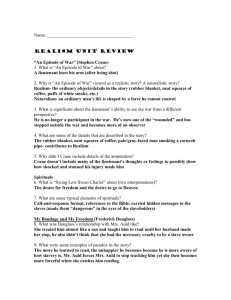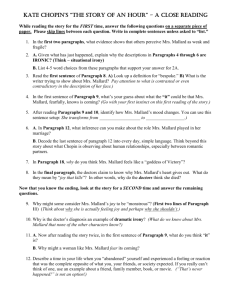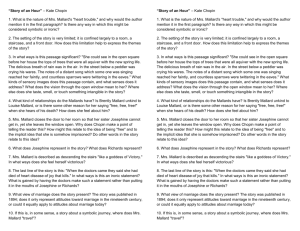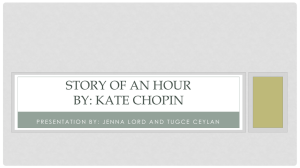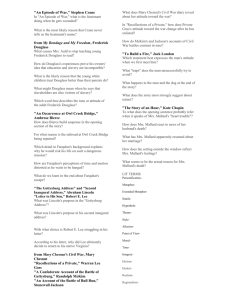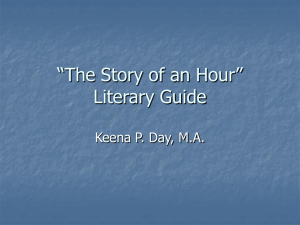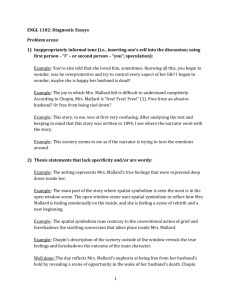Name - plcenglish
advertisement
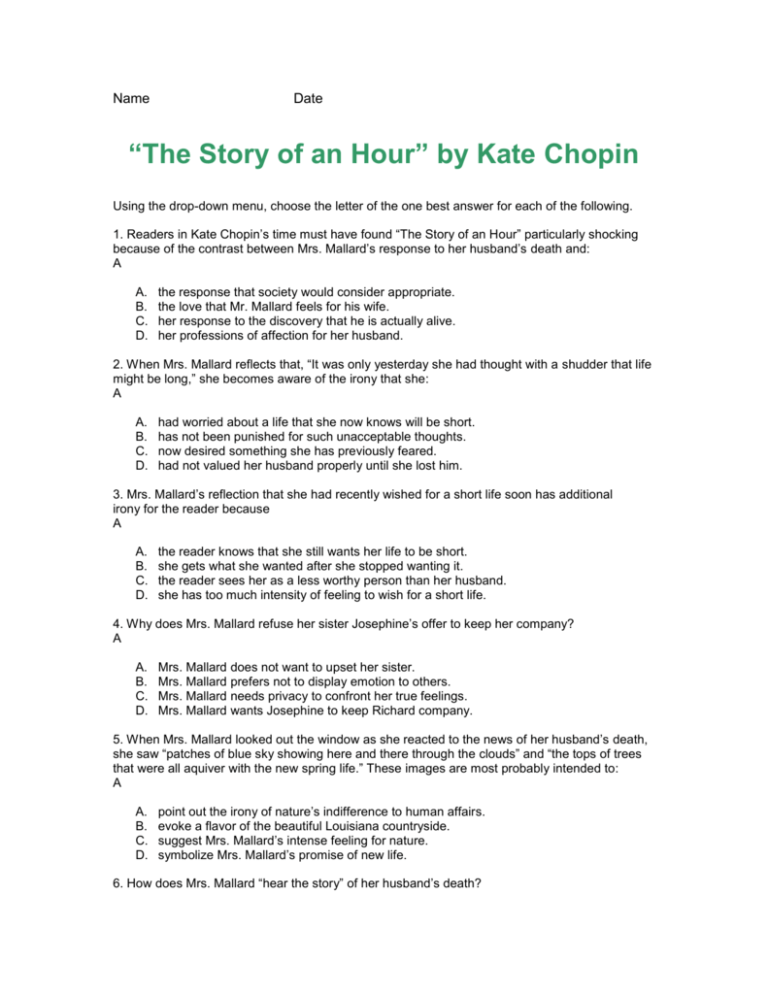
Name Date “The Story of an Hour” by Kate Chopin Using the drop-down menu, choose the letter of the one best answer for each of the following. 1. Readers in Kate Chopin’s time must have found “The Story of an Hour” particularly shocking because of the contrast between Mrs. Mallard’s response to her husband’s death and: A A. B. C. D. the response that society would consider appropriate. the love that Mr. Mallard feels for his wife. her response to the discovery that he is actually alive. her professions of affection for her husband. 2. When Mrs. Mallard reflects that, “It was only yesterday she had thought with a shudder that life might be long,” she becomes aware of the irony that she: A A. B. C. D. had worried about a life that she now knows will be short. has not been punished for such unacceptable thoughts. now desired something she has previously feared. had not valued her husband properly until she lost him. 3. Mrs. Mallard’s reflection that she had recently wished for a short life soon has additional irony for the reader because A A. B. C. D. the reader knows that she still wants her life to be short. she gets what she wanted after she stopped wanting it. the reader sees her as a less worthy person than her husband. she has too much intensity of feeling to wish for a short life. 4. Why does Mrs. Mallard refuse her sister Josephine’s offer to keep her company? A A. B. C. D. Mrs. Mallard does not want to upset her sister. Mrs. Mallard prefers not to display emotion to others. Mrs. Mallard needs privacy to confront her true feelings. Mrs. Mallard wants Josephine to keep Richard company. 5. When Mrs. Mallard looked out the window as she reacted to the news of her husband’s death, she saw “patches of blue sky showing here and there through the clouds” and “the tops of trees that were all aquiver with the new spring life.” These images are most probably intended to: A A. B. C. D. point out the irony of nature’s indifference to human affairs. evoke a flavor of the beautiful Louisiana countryside. suggest Mrs. Mallard’s intense feeling for nature. symbolize Mrs. Mallard’s promise of new life. 6. How does Mrs. Mallard “hear the story” of her husband’s death? A A. B. C. D. with a paralyzed inability to accept its meaning with sudden, wild weeping with a shriek of joy and relief with a sigh and a dull stare in her eyes 7. What is the meaning of the following passage from the story? A A kind intention or a cruel intention made the act seem no less a crime as she looked upon it in that brief moment of illumination. A. Mrs. Mallard finally realizes that her husband had been cruel to her when she thought he was being kind. B. She hadn’t known until now whether her husband’s intention had been cruel or kind. C. She now understands that imposing your own will on someone is a crime, no matter whether the intention is cruel or kind. D. She suddenly understands that her self-assertion is a crime, whether her intention was cruel or kind. 8. Under which type of irony would you classify Josephine’s fear that her sister will “make herself ill” by grieving alone in her room? A A. B. C. D. situational dramatic verbal none of the above 9. In “The Story of an Hour,” Kate Chopin is primarily concerned with the: A A. B. C. D. sacrilege of rejoicing at someone’s death. importance of confirming reports of tragic events. difficulty of distinguishing between illusion and reality. individual’s right to self-expression. 10. After the initial storm of tears, Mrs. Mallard’s response to the news of her husband’s is motivated largely by a wave of: A A. B. C. D. self-assertion. anger. self-pity. vengeance. 11. Which of the following excerpts from “The Story of an Hour” best illustrates the author’s use of irony? A A. “She wept at once, with sudden, wild abandonment, in her sister’s arms.” B. “She was young, with a fair, calm face, whose lines bespoke repression and even a certain strength.” C. “And yet she had loved him—sometimes. Often she had not. What did it matter!” D. “‘Louise, open the door! I beg; open the door—you will make yourself ill.’” 12. Kate Chopin’s “The Story of an Hour” is a powerful illustration of the: A A. B. C. D. cruel irony of fate. tragedy of thwarted love. emptiness of marriage. injustice of life. 13. Why is Richards so concerned about “bearing the sad message” to Mrs. Mallard himself? A A. B. C. D. He wants to keep less sensitive and careful friends from doing it. He doesn’t trust Josephine to get the message right. He wants to see her reaction when she first hears the news. He knows she won’t believe the story unless he confirms it. 14. What is the best reason for considering the title “The Story of an Hour” ironic? A A. B. C. D. The events in the story take much longer than an hour. It is really a story about people. The title is deceptively undramatic compared to the events. The words suggest the opposite of their usual meaning. 15. What word best characterizes this statement about Louise’s feeling for her husband? A And yet she had loved him—sometimes. A. B. C. D. joyful sorrowful ironic insincere Unit 4: Division, Reconciliation,Expansion (1850–1914) Essay Questions—Respond to each of the following in paragraph form, using the boxes provided. 21. Do you admire Mrs. Mallard for daring to take joy in this revelation of freedom, or do you condemn her for reacting with such callousness to her husband’s death? Explain your answer in an essay, and cite details from the selection to support it. 22. How might Josephine and Richards have reacted if they had learned about Mrs. Mallard’s true feelings regarding her husband’s death? Imagine their reactions and write an essay describing and explaining them. Cite examples from the selection to explain what you know about each character, as well as the attitudes of the period. Use these examples to support your conclusions. 23. The Victorian world in which Kate Chopin lived and wrote was one of strong social restraints. The rules and expectations of marriage, the exaltation of romantic love, and the dominance of the husband over the wife prevented many Victorian women from viewing their circumstances honestly. Do you think Mrs. Mallard is a victim of Victorian attitudes toward marriage? Why or why not? Write an essay in which you give your opinion of Mrs. Mallard and her circumstances. Support your argument with evidence from Mrs. Mallard’s thoughts in the aftermath of her husband’s presumed death. © Prentice-Hall, Inc. The Story of an Hour
